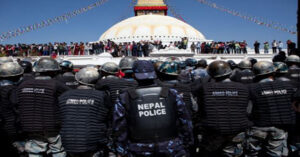 The Nepali government has failed to commit to respecting and protecting the rights of Tibetan refugees living in the country during the United Nations (UN) Universal Periodic Review (UPR). UN member states gave recommendations regarding Tibetan refugees on 21 January 21this year as part of Nepal’s third UPR cycle. However, the government “noted” – but did not “accept” – some of the recommendations. The UPR report of Nepal was adopted on July8, during the 47th session of the UN Human Rights Council.
The Nepali government has failed to commit to respecting and protecting the rights of Tibetan refugees living in the country during the United Nations (UN) Universal Periodic Review (UPR). UN member states gave recommendations regarding Tibetan refugees on 21 January 21this year as part of Nepal’s third UPR cycle. However, the government “noted” – but did not “accept” – some of the recommendations. The UPR report of Nepal was adopted on July8, during the 47th session of the UN Human Rights Council.
The Nepali government did not accept a key recommendation calling for the registration and verification of all Tibetan refugees, followed by the issuance of identity documents. Lack of documentation means Tibetan refugees in Nepal face a lack of access to education, legal work opportunities and medical and other government services, and leaves them vulnerable to crime and human rights violations with no recourse before the law.
The government did not support another recommendation calling for efforts to be stepped up in the fight against segregation and discrimination of ethnic minorities, including Tibetans. Two other recommendations not accepted called for the respect of the principle of non-refoulement: the government claimed it was abiding by this fundamental principle that stipulates no one should be returned to a country where they would face persecution or danger, however the International Federation for Human Rights (FIDH) says there is evidence that Nepal is not adhering to this principle.
Neither did the government accept the three recommendations calling for the ratification of the 1951 Refugee Convention, and one recommendation that called for the adoption of national legislation in accordance with international standards on the protection of refugees.
FIDH Secretary-General Adilur Rahman Khan said, “Nepal should be praised for hosting thousands of Tibetan refugees for decades, but this is not enough. Sheltering refugees must also mean giving them full protection in accordance with relevant international human rights principles and treaties. The Nepali government must take urgent steps to grant legal status to Tibetans and ensure their fundamental rights are respected and protected”.
The Nepali government did accept many recommendations that, if adequately and effectively implemented, could address some of the human rights challenges that Tibetans face in Nepal. These include recommendations to ensure the rights to freedom of expression and freedom of peaceful assembly; protect the rights of vulnerable groups, including ethnic minorities and protect the rights of persons belonging to religious minorities.
Tibetans in Nepal publicly expressing opinions about the human rights situation in Tibet, or displaying Tibetan national symbols or being involved in political activism have been subjected to arrests and harassment. They also face restrictions on religious and political celebrations and Nepali authorities have continued to impose bans on their public gatherings.




 Print
Print Email
Email